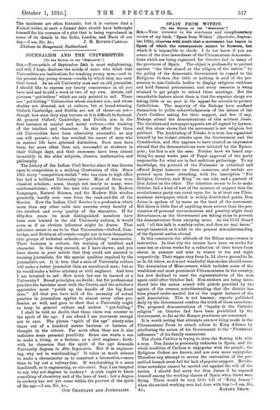JOURNALISM AND THE UNIVERSITIES.
[To TUX Eorroo or THE "Szooraros."]
Sin,—Your article of September 24th is most enlightening, and will, I hope, disabuse the minds of some who think that Universities are institutions for teaqhing young men—and in the present day young women—crafta by which they can earn their bread. As an old University man and an cold journalist, I- should like to express my hearty concurrence in all you have said and to add a word or two of my own. Artists call pictures " pot-boilers" which are only painted to sell. There are "pot-boiling" Universities whose students aim, and whose studies are directed, not at culture, but at bread-winning. Oxford, Cambridge, and Dublin are not of these—as yet— though how soon they may become so it is difficult to forecast. At present Oxford, Cambridge, and Dublin aim in the first instance at mental and moral culture,—the training of the intellect and character. In this effort the three old Universities have been admirably successful; as any one will peroeiva who has watched the career of men who in mature life have attained distinction. Such men have been, far more often than not, successful as students in their College days, and their successes have been almost invariably in the older' subjects, classics, mathematics, and philosophy.
The history of the Indian Civil Service since it was thrown open to competition is a striking illustration of this. Since 1855 every "competition-wallah " who has risen to high office has had a brilliant University career. Most of them were classical scholars ; some, though not nearly so many, were mathematicians ; while the men who competed in Modern Languages, Natural Science, and the Modern Side studies generally, hardly ever rose from the rank-and-file of the Service. Now the Indian Civil Service is a profession which more than any other calls into exercise every faculty of the intellect and every quality of the character. If for fifty-five years its most distinguished members have been men trained in the old University culture, it would seem as if an obvious inference might be drawn. That inference seems to me to be that Universities—Oxford, Cam- bridge, and Dublin at all events—ought not to turn themselves into groups of technical schools,—" pot-boiling " seminaries. Their business is culture, the training of intellect and character. In this they succeed, as I have shown ; and you have shown in your article that they could not succeed in training journalists, for the special qualities required by the journalist's art. It is true that a man of University culture will make a better journalist than an uncultured man ; but so he would make a better attorney or civil engineer. And here I am tempted to ask : How much law can be learned at a University ? Broad principles, no doubt ; but for professional practice the barrister must walk the Courts, and the solicitor's apprentice must "polish -up the handle of the big front door." All that you have said of the necessity of actual practice in journalism applies to almost every other pro- fession as well, and goes to show that a University ought to keep to general culture and eschew " pot-boiling."
I shall be told, no doubt, that these views run counter to the spirit of the age. I am afraid I am irreverent enough not to care. The phrase "spirit of the age" ninety-nine times out of a hundred means haziness or laziness of thought in the utterer. Far more often than not it also indicates some personal proclivity. Some one wants a son to make a living, or a fortune, as a civil engineer ; forth- with he clamours that the spirit of the age demands lJniversity degrees in Ate Ingeniaria. But if in engineer- ing, why not in watchmaking ? It takes as much science to make a chronometer as to construct a locomotive,—more than to lay out a railway-line. If watchmaking is a mere handicraft, so is engineering, or nice-versa. Nay, I am tempted to say, why not degrees in cookery ? A cook ought to know something of chemistry and of the laws of heat ; but a degree tin cookery has not yet come within the purview of the spirit .of the age.—I am, Sir, &c., OLD GRADUATE AND JOURNALIST.


























































 Previous page
Previous page